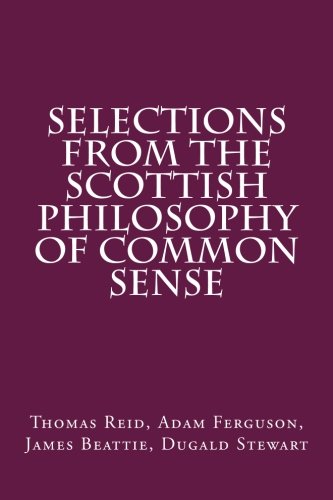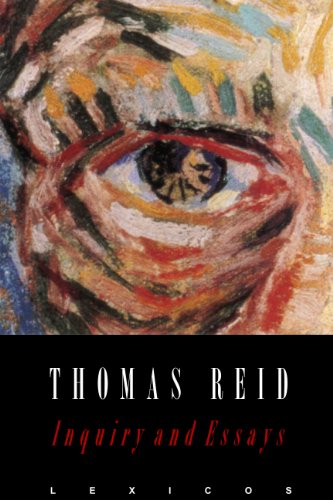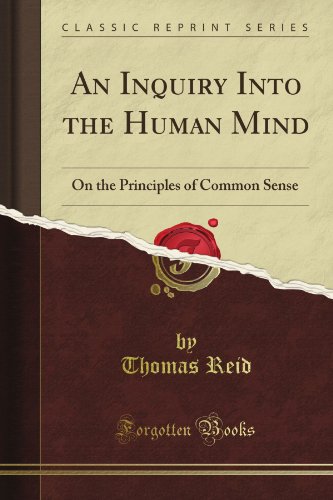Background
Thomas Reid was born April 26, 1710 in Glasgow, Scotland.
He was the son of Lewis and Margaret Reid.



(The Scottish Philosophy of Common Sense originated as a p...)
The Scottish Philosophy of Common Sense originated as a protest against the philosophy of the greatest Scottish philosopher. Humes sceptical conclusions did not excite as much opposition as might have been expected. But in Scotland especially there was a good deal of spoken criticism which was never written; and some who would have liked to denounce Humes doctrines in print were restrained by the salutary reflection that if they were challenged to give reasons for their criticism they would find it uncommonly difficult to do so. Humes scepticism was disliked, but it was difficult to see how it could be adequately met. At this point Thomas Reid stepped into the field. He was the only man of his time who really understood the genesis of Humes scepticism and succeeded in locating its sources. At first sight it would seem that this discovery required no peculiar perspicuity. It would seem that nobody could help seeing that Humes sceptical conclusions were based on Lockes premises, and that Hume could never be successfully opposed by any critic who accepted Lockes assumptions. But this is precisely one of those obvious things that is noticed by nobody. And in fact Reid was the first man to see it clearly. It thus became his duty to question the assumptions on which all his own early thought had been based. The result of this reflection was the conclusion that, since the ideal theory of Locke and Berkeley logically led to Humes scepticism, and since scepticism was intolerable, that theory would have to be amended, or, if necessary, abandoned. This volume contains works by Thomas Reid, Adam Ferguson, James Beattie, and Dugald Stewart
http://www.amazon.com/gp/product/1480187984/?tag=2022091-20

(-Contains a biographical essay placing Reids work in the...)
-Contains a biographical essay placing Reids work in the context of his times, as well as an up-to-date bibliography of secondary works. Thomas Reid (1710-1796) was one of the great figures of the Scottish Enlightenment, and one of the giants of modern philosophy. A founder and perhaps the greatest proponent of the common sense school of philosophy, he offered trenchant criticisms of earlier figures such as John Locke and David Hume, and constructed his own path-breaking theory of epistemology and perception. However, his interests ranged widely, and his works offer profound insights into topics as diverse as causation, free will, ethics, and aesthetics. This edition includes Reids three great philosophical masterpieces: An Inquiry into the Human Mind on the Principles of Common Sense (1764), Essays on the Intellectual Powers of Man (1785), and Essays on the Active Powers of Man (1788). All three are presented complete and unabridged. They have been meticulously edited and formatted for Kindle. The edition includes an active table of contents and is fully searchable. Reid advocates fascinating views and voices forceful arguments on their behalf, the plausibility of which has only ripened with age. Ryan Nichols, Hume Studies
http://www.amazon.com/gp/product/B008FKBQ78/?tag=2022091-20

(Few, who are capable of attending to the operations of th...)
Few, who are capable of attending to the operations of their own minds, will weigh deliber ately what is here advanced, before they pass sentence upon it. To such I appeal, as the only competent judges. If they disapprove, I am probably in the wrong, and shall be ready to change my opinion upon convic tion. If they approve, the Many will at least yield to their authority, as they always do. HOWEVER contrary my notions are to those of the writers I have mentioned, their speculations have been of great use to me, and seem even to point out the road which I have taken: and your Lordship knows, that the merit of useful discoveries is sometimes not more justly due to those that have hit upon them, than to others that have ripened them, and brought them to the birth. I ACKNOWLEDGE, my Lord, that I never thought of calling in question the principles commonly received with regard to the human understanding, until the Treatise of Human Nature was published in the year 1739. (Typographical errors above are due to OCR software and don't occur in the book.) About the Publisher Forgotten Books is a publisher of historical writings, such as: Philosophy, Classics, Science, Religion, History, Folklore and Mythology. Forgotten Books' Classic Reprint Series utilizes the latest technology to regenerate facsimiles of historically important writings. Careful attention has been made to accurately preserve the original format of each page whilst digitally enhancing the aged text. Read books online for free at www.forgottenbooks.org
http://www.amazon.com/gp/product/1440093148/?tag=2022091-20
clergyman philosopher professor teacher
Thomas Reid was born April 26, 1710 in Glasgow, Scotland.
He was the son of Lewis and Margaret Reid.
Until he was 12 years old, he was educated at home and in the local parish school; he then entered Marischal College, from which he graduated in 1726.
During the next decade after graduation he studied theology and read widely, and in 1737 he became a Presbyterian minister of the Church of Scotland.
In 1752 he gave up his ministry at New Machar to become a professor of philosophy at King's College, Aberdeen.
For the remaining 15 years of his life Reid published extensively.
The philosophy of common sense took its point of departure from Hume's skepticism toward impressions and ideas.
Reid taught that conscience shows immediately and surely what is right and meritorious, he regarded reason, therefore, as necessary only to discover how to attain ends already discerned by one's moral sense.
Reid's philosophy is contained in three books: An Inquiry into the Human Mind on the Principles of Common Sense (1764), Essays on the Intellectual Powers of Man (1785), and Essays on the Active Powers of Man (1788).
Reid's influence dominated British philosophy until displaced by that of the idealism of Kant and Hegel.
It spread to France through the teaching of Victor Cousin and to the United States through that of James McCosh and Noah Porter.
Reid is famous for his realistic theory of sense-experience. Through this theory he sought to stem the Lockian skepticism that reached an extreme form in Hume.
Also he was the founder of the Scottish School of Common Sense and played an integral role in the Scottish Enlightenment.
(Few, who are capable of attending to the operations of th...)
(-Contains a biographical essay placing Reids work in the...)
(The Scottish Philosophy of Common Sense originated as a p...)
He served for 16 years as a Presbyterian clergyman.
Reid replied that perception always has an object distinct from the act by which it is perceived, an object which may exist whether it be perceived or not.
He sometimes spoke of sensation as only "the sign" of external objects, thus reexposing himself to the disintegrating arguments of Hume.
Even then he upheld realism by insisting that the simplest act of the mind involves judgments about what lies over against the mind, and he argued valiantly that these judgments are "necessary in the conduct of life, " and "evident in themselves. "
Reid oscillated between natural and inferential realism.
In 1740 Reid married his cousin Elizabeth Reid, and during their long life together they raised nine children.
